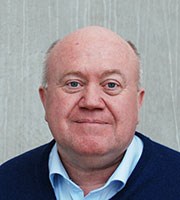Best medical school in Sweden
Örebro University Medical School is the best in the country, according to the responses in a questionnaire by the Swedish Medical Association. The questionnaire was distributed to last year's medical graduates in Sweden. We are on the right track, says Hans Hjelmqvist, programme coordinator.

"Students at Örebro start their clinical placements at an early stage. We prepare for working life and what it is actually like to work as a physician. That focus on professionalism sets Örebro apart," says Hans Hjelmqvist, who also views the dialogue with the students as key to the quality of the teaching.
He believes the pedagogy used is one reason for the students' enthusiastic assessment of the programme. Problem-based learning, PBL, is an approach that builds on the reality facing physicians in their working life. The teaching methods as well as the experience of our partner universities in Maastricht and Glasgow were immensely important when Örebro set up its medical programme," says Hans Hjelmqvist.
Today, PBL is by no means unique to Örebro, but it provided the foundation for teaching already from the launch of the new medical school. Most other universities in Sweden have in turn had to develop their traditional teaching methods using this modern pedagogical approach.
"The perfect programme"
This is the third time the questionnaire of the quality of medical programmes in Sweden is carried out. Örebro featured for the first time last year since 2016 was the year the programme saw its first group of medical graduates.
In all of the 16 questions, Örebro University grabs the top spot, together with Linköping University. The most comprehensive question concerns what prerequisites students have been given to "work as doctors". All respondents in Örebro state that they are satisfied and 65 per cent have ticked the box "very satisfied".
Örebro University receives a passing grade in all questionnaire responses. Over half of the graduates feel that they have come as close to the "perfect programme" as they could. The respondents in Örebro also feel that they are well-prepared for leadership and development work, and for cooperating with other groups of healthcare professionals. These are areas, however, in which students at other universities are not so happy with their training.
"We are on the right track"
Hans Hjelmqvist is keeping a level head, despite top-notch scores for Örebro.
"What matters most to us is that the responses from the students show us that we are on the right track. But we cannot become complacent, we have to progress and have the ability to take in every new development within medicine in a way that benefits our programme," he says.
One challenge that faces Örebro with the growing number of medical students is finding enough placements. A problem which Örebro shares with other medical schools.
The questionnaire was distributed to the just over 1,000 students graduating with a Degree of Master of Science in Medicine in 2016 from the universities in Örebro, Gothenburg, Linköping, Uppsala, Lund, Umeå, and Karolinska institutet in Stockholm. Of these, 417 completed the questionnaire and 27 responded in part. This gives a response rate of 40 per cent. In Örebro, 17 out of 37 participated.
